Acupuncture for Psoriasis: A Guide to Natural Remedies for your Skin
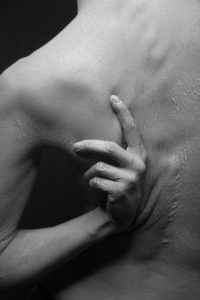
You’re reading this wondering if there’s something out there that can help you or a loved one with psoriasis.
People that are looking for alternative solutions to their psoriasis generally fall into three categories: 1) they want to go the holistic route from the get-go, 2) they’ve tried conventional treatments like corticosteroids or immune-suppressing drugs without success, or 3) conventional treatments have worked for them but the side-effects were too much for their body.
Regardless of the path that’s led you here, the goal is the same: you’re looking for a way to manage your skin and the complications that come along with it.
Because most people don’t get it.
Psoriasis isn’t just a skin condition. It’s an autoimmune condition. It’s a systemic disease that affects the whole body. It creates inflammation not only in the skin but also in the joints. And to top it all off, it greatly affects emotional health.
The goal of this post is to outline the opportunities that exist for your psoriasis using acupuncture and Chinese medicine.
Does acupuncture help with psoriasis?
Take a look at the pictures below. The difference between these two photos is 3 months.
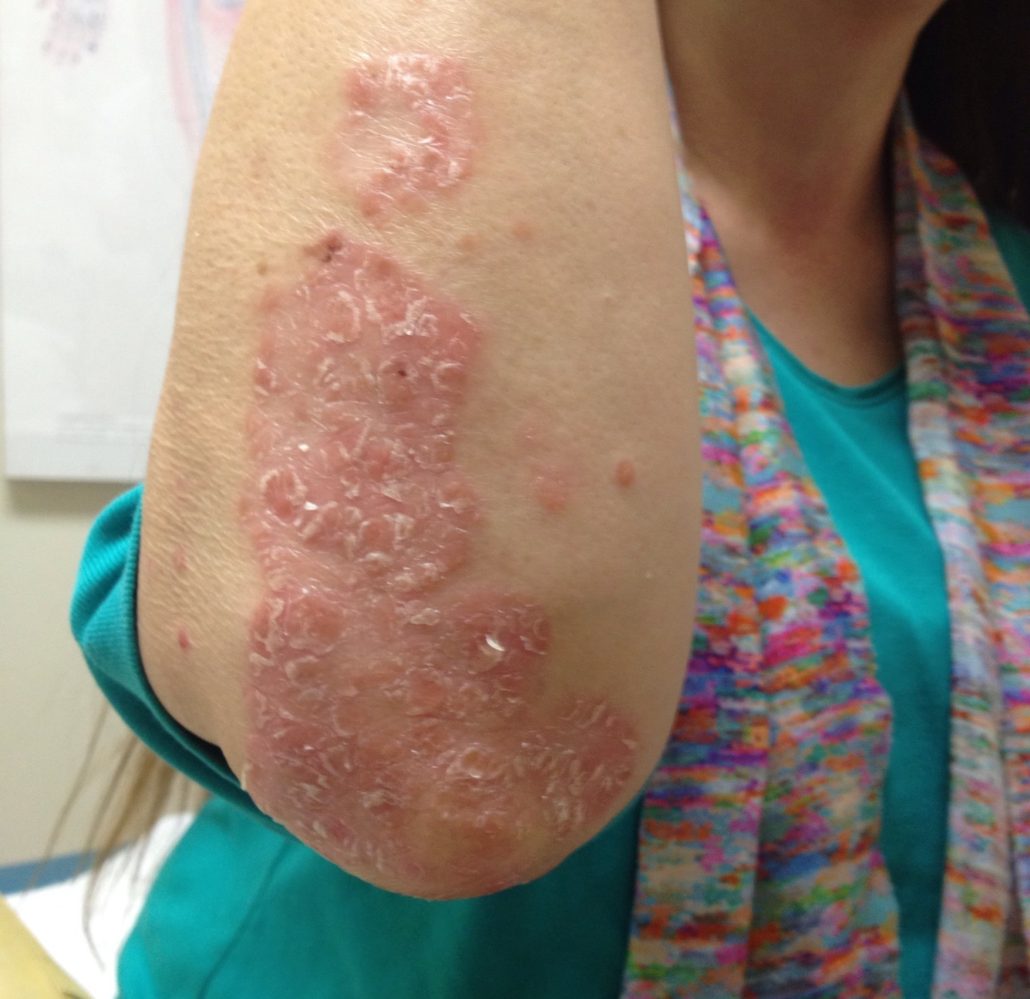
Day 1 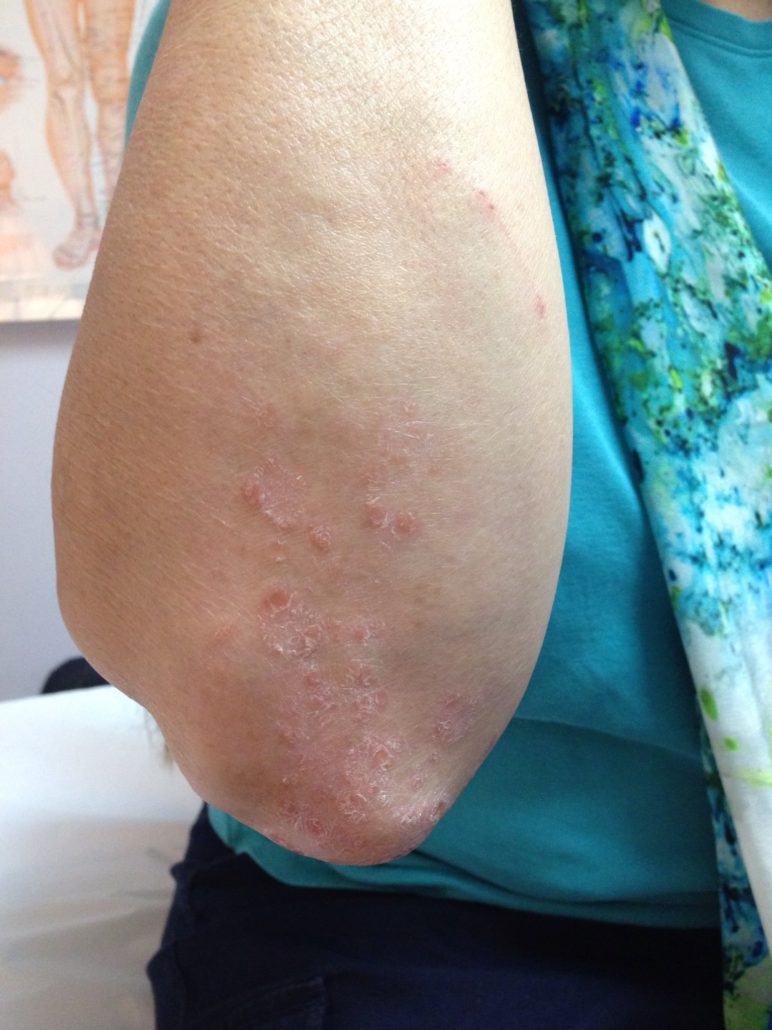
3 Months Later
This is a patient who had lived with psoriasis for over 20 years. The condition had affected her elbows, scalp, ears, knees, and entire back. She also had pain and swelling in some of her joints, a condition known as psoriatic arthritis.
By the time she had come to my clinic she had already been trying to manage her psoriasis for decades with various conventional treatments like topical corticosteroids and light therapy. While the topical steroids helped clear her skin, the moment she stopped using them the skin inflammation would return.
Eventually she decided to try and see if she could naturally manage her skin without the use of medications.
We decided on a three-month long treatment plan to see if the treatments could sustainably help her. The plan consisted of:
1) Acupuncture
2) Herbal Medicine
3) Nutrition advice
As you can see, the changes were significant. Her skin was feeling and healing at a level comparable to the use of the topical steroids. She was incredibly happy that she found a way to manage her skin naturally and was able to avoid the side-effects that come along with steroid treatments.
Below is her progression from the first month to the third month.

Day 1 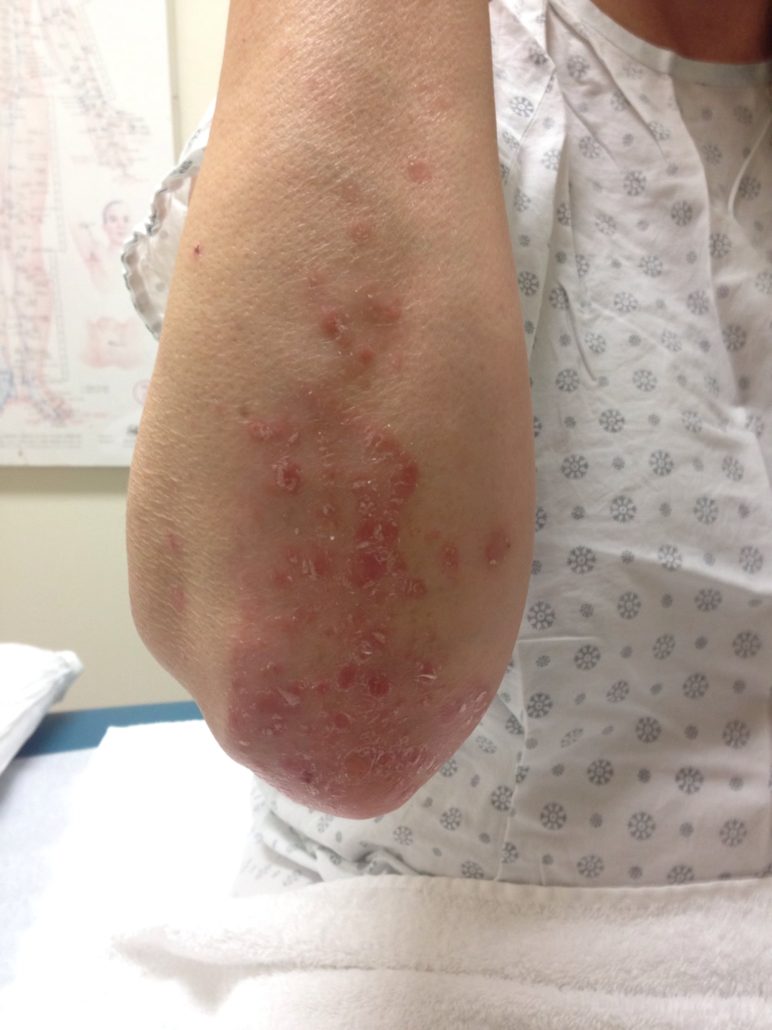
1 Month Later
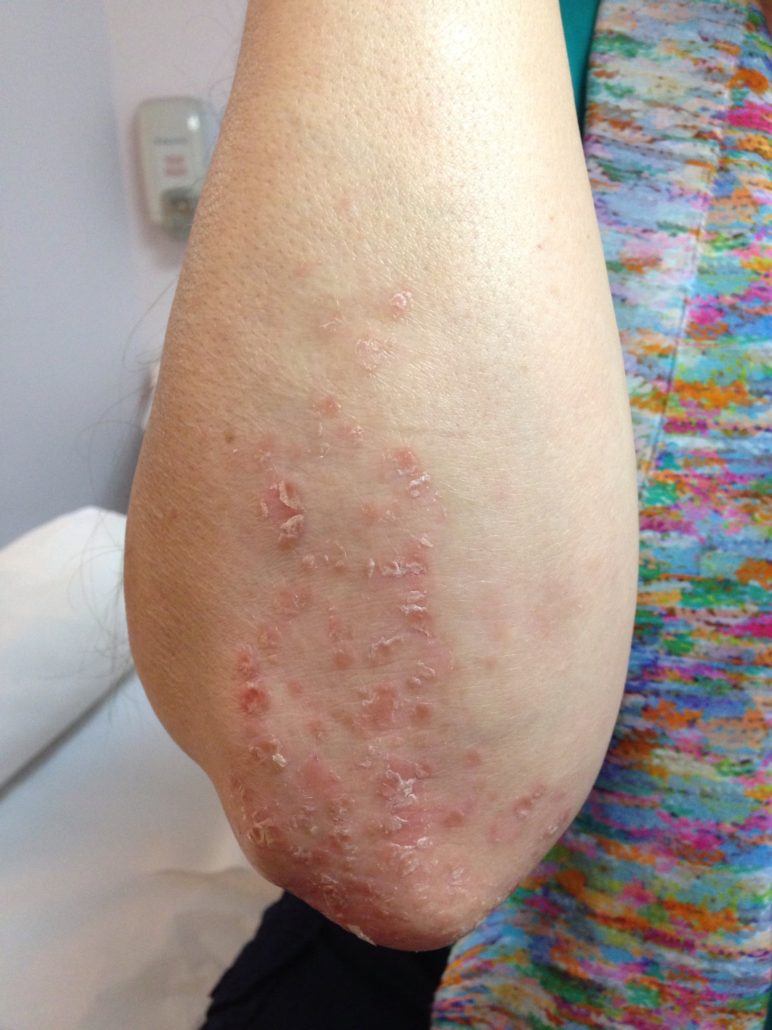
2 Months Later 
3 Months Later
Does acupuncture help with psoriasis?
One of the principle features of Chinese medicine theory is the focus on treating the underlying pattern rather than treating a particular disease. In this sense, TCM does not have a set diagnosis and treatment protocol for the disease “psoriasis.” Instead, it has a set of differential diagnoses and treatment protocols for specific symptom presentations in the general category of skin disorders. The following are the various differential diagnosis patterns that would be applicable to a psoriasis patient (1):
- Blood-heat: “red macules or papules that increase and proliferate rapidly. Red scales pile up and are easily shed when scratched.”
- Blood-deficient and dry: “pale and very dry plaques which are covered by a thin layer of white scales.”
- Blood Stasis: “dark-purple plaques covered by thick scales.”
- Damp-Heat: “dark red macules or papules covered by greasy or thick, crust-like scales. The skin weeps. There may also be pustules.”
- Toxic Heat: “erythematous or pustular lesions which develop and spread rapidly, often piling up together. There are red scales that shed easily and there is itching, burning, and pain.”
In clinical practice, we find that a patient presents with a mixed pattern. This means that they don’t just fall into a single pattern of blood-heat or toxic heat. Very often, they’ll present with two or more of these patterns at the same time. It is then up to the practitioner to discern which pattern is more dominant in the patient’s presentation and to treat accordingly.
Does acupuncture help with psoriasis?
Acupuncture is the use of sterile, thin needles on different points along the body to illicit a healing response in the body. Acupuncture has been shown to promote the release of the body’s own natural painkillers, reduce inflammation, decrease stress, and improve blood flow.
Acupuncture can help with the following symptoms of psoriasis:
- Red, burning skin lesions
- Itching
- Dry, scaling, flaking of skin
- Joint pain
- Depression and anxiety
You may be surprised to see depression and anxiety on the list. But the fact is that a large number of individuals with psoriasis suffer emotionally: they often report experiencing anxiety, depression, shame, low self-esteem, etc.
Acupuncture can have wonderful regulating effects on the nervous system and help individuals reduce their stress and anxiety. It is for this exact reason that many western doctors are open to acupuncture. Acupuncture’s effect on reducing stress is well documented. Since stress and anxiety can exacerbate autoimmune diseases, many doctors are open to having their patients try acupuncture for its calming benefits.
Herbal Medicine for Psoriasis: Natural Remedies for Psoriasis
Chinese medicine also relies heavily on the use of herbal prescriptions as a way to naturally help the body recover. Different herbs have different properties and effects on the body. The key is to use herbs that treat the patient’s disease pattern.
We talked about disease patterns earlier in the article. How there isn’t just one single treatment for psoriasis. That two people with psoriasis can present with different symptoms and thus different disease patterns. An individual with redder and burning psoriatic lesions will require different herbs than the individual whose psoriasis is very pale, dry and flaky.
The key is to differentiate and identify the appropriate pattern.
Many of the herbs used for psoriasis have a heat-clearing effect. In other words, they have an anti-inflammatory mechanism.
The theory behind anti-inflammatory herbs is that they allow the skin to heal by interrupting the chronic inflammatory process continuously damaging the skin. This helps to reduce burning, redness, and plaques on the skin.
What Foods Trigger Psoriasis?
It’s important to remember that psoriasis is a chronic inflammatory disease. So we want to avoid foods that promote inflammation in the body. Please note: diet should never be dogmatic. What works for one person’s body, may not be as beneficial for another’s body.
The age old debate of eating meat vs not eating meat is a perfect example. Some people feel healthier and great when not consuming animal protein, whereas others react the exact opposite. The idea is to understand what works for your body.
When trying to understand what triggers your psoriasis, an anti-inflammatory diet is a great place to start. The basic guidelines for an anti-inflammatory diet are as follows:
A diet rich in vegetables and fruits, healthy fats, lean proteins, whole grains, and lots of fresh produce. In other words, a Mediterranean diet.
Certain foods are avoided because they tend to promote inflammation. These foods include:
- Dairy
- Nightshade vegetables (tomatoes, potatoes, eggplants, bell peppers, etc)
- Eggs
- Gluten
- Refined sugars
- Alcohol
- Processed foods
The idea is to avoid all possible triggers (pro-inflammatory foods) for about 3-4 weeks. Once you’ve done that and your symptoms feel calmer overall, you begin to reintroduce the foods you’ve been avoiding one by one. You’ll reintroduce one new food every 3 days, and it’s important to keep track of how your body is feeling during this time. This allows you to succinctly identify what foods cause flare ups for your psoriasis.
Conclusion
Ultimately, if you decide to work to go down the holistic route, it’s important to find a Chinese medicine practitioner that you trust and work well with. Interview your practitioner before you commit. Ask them about their experience treating psoriasis and their approach. See if that approach aligns with your beliefs. It’s not just about finding the best doctor; it’s about finding the right doctor for you!
References
1) Maciocia G. Diagnosis In Chinese Medicine. Edinburgh: Churchill Livingstone; 2004.

